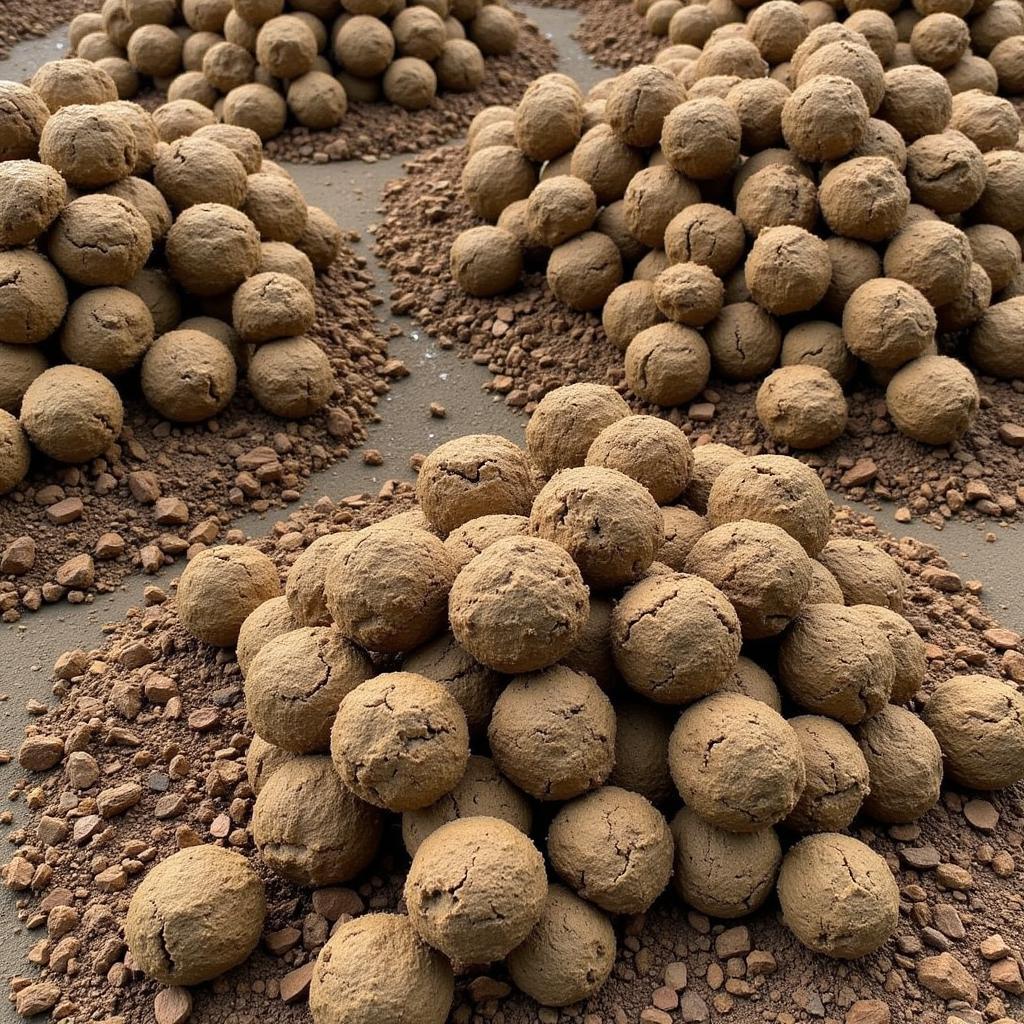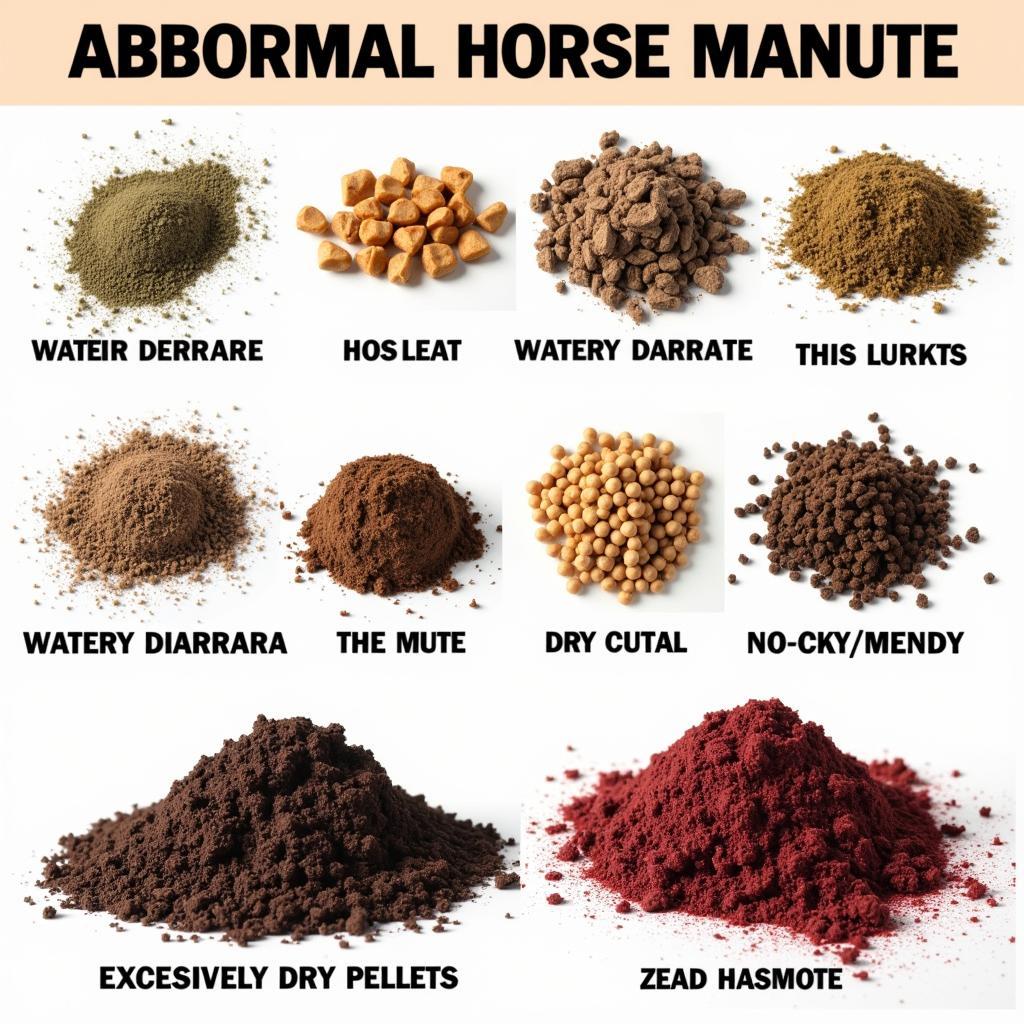Horse Darts, also known as fecal balls, are a normal part of equine digestion. Understanding their consistency, frequency, and appearance can provide valuable insights into your horse’s overall health. Changes in these factors can signal underlying digestive issues and warrant further investigation.
Decoding Your Horse’s Digestive Health Through Darts
Examining horse darts can reveal much about their well-being. Healthy horse manure should be firm, formed into distinct balls, and have a slightly moist consistency. Variations in color, texture, and frequency can indicate dietary imbalances, stress, or even potential illnesses. By regularly observing your horse’s droppings, you can proactively address potential health concerns.
What are Normal Horse Darts?
Normal horse darts are typically olive green to brown, uniform in size and shape, and pass easily. They break apart easily when stepped on and have a slightly sweet, grassy smell. Any significant deviation from this norm, such as excessively dry, watery, or foul-smelling manure, warrants veterinary attention.
A healthy horse will typically defecate 8-12 times a day. This frequency can be influenced by factors such as diet, exercise, and hydration. Monitoring the frequency of your horse’s bowel movements can help you identify potential problems early on.
 Normal Horse Manure: Appearance and Characteristics
Normal Horse Manure: Appearance and Characteristics
Common Causes of Abnormal Horse Darts
Several factors can contribute to abnormalities in horse darts, including dietary changes, stress, parasites, and underlying medical conditions. Sudden changes in feed, inadequate access to water, or exposure to new environments can disrupt the delicate balance of the equine digestive system.
Parasites, such as worms, can also significantly impact digestive health, leading to changes in manure consistency and frequency. Regular deworming is essential for maintaining optimal digestive function.
 Abnormal Horse Manure: Recognizing Potential Problems
Abnormal Horse Manure: Recognizing Potential Problems
Recognizing and Addressing Digestive Issues
Being attuned to changes in your horse’s darts is crucial for early detection and intervention. If you notice any significant deviations from the norm, such as persistent diarrhea, constipation, or the presence of blood or mucus in the manure, consult your veterinarian immediately. Early diagnosis and treatment can significantly improve outcomes and prevent complications.
When to Consult a Veterinarian
While minor variations in manure consistency can be normal, certain signs warrant immediate veterinary attention. These include persistent diarrhea, especially if accompanied by lethargy or loss of appetite, severe constipation, and the presence of blood or mucus in the manure. These symptoms can indicate serious underlying conditions requiring prompt medical intervention.
Dr. Emily Carter, DVM, equine specialist at Equine Wellness Center, advises, “Regularly observing your horse’s manure is a simple yet powerful tool for monitoring their digestive health. Don’t hesitate to contact your veterinarian if you notice any concerning changes.”
Maintaining Optimal Digestive Health
Promoting good digestive health in horses involves providing a balanced diet, ensuring adequate hydration, managing stress, and implementing a regular deworming program. Offering high-quality forage, such as hay or pasture, forms the foundation of a healthy equine diet. Fresh, clean water should always be readily available.
Dr. Sarah Mitchell, PhD in Animal Nutrition, emphasizes, “A balanced diet and proper hydration are crucial for maintaining a healthy equine digestive system. Providing adequate forage and minimizing stress can significantly reduce the risk of digestive issues.”
In conclusion, understanding horse darts is essential for responsible horse ownership. By regularly observing and interpreting your horse’s manure, you can proactively address potential health concerns and ensure your equine companion’s well-being. Remember, any significant or persistent changes in your horse’s darts warrant veterinary attention.
FAQ:
- How often should a horse defecate?
- What does healthy horse manure look like?
- What causes diarrhea in horses?
- Can stress affect a horse’s digestion?
- What are the signs of colic in horses?
- How can I improve my horse’s digestive health?
- What is the importance of regular deworming?
We understand you may have further questions about equine care. For additional resources and information, please visit hobby horse pattern free.
When you need support, please contact us at Phone Number: 0772127271, Email: [email protected] Or visit us at QGM2+WX2, Vị Trung, Vị Thuỷ, Hậu Giang, Vietnam. We have a 24/7 customer support team.